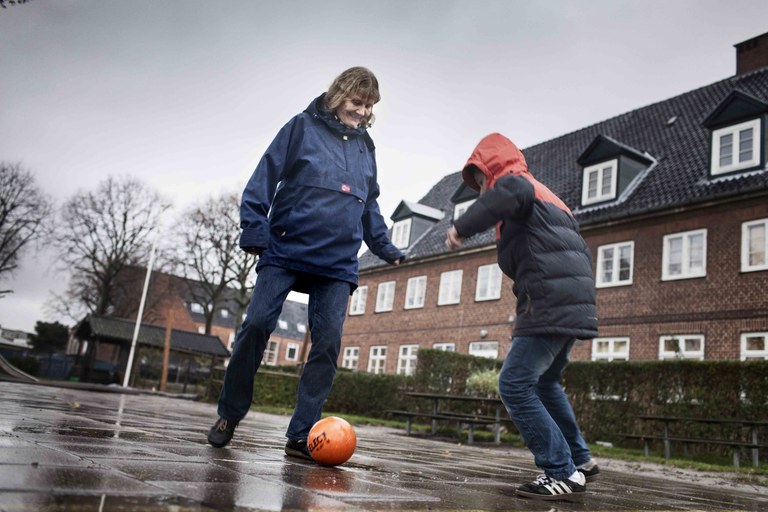Danish educator: my economy suffers because of part time work
Dorte Nielsen is one of many Danish female public sector employees in part time work. Her working life has improved but her economy has suffered.
Many Danish educators work part time. Dorte Nielsen is one of them. She chose to go part time herself in order to get a better working life. As a result her private economy is now so tight that she and her husband have been forced to take on a Sunday cleaning job.
“Education is a poorly paid female occupation, and when I reduced my hours eight years ago from 37 to 30 my economy became seriously strained. My husband and I have therefore been cleaning on Sundays for some years now in order to earn a little extra, but the cleaning job was taken over by Polish labour, so we are really up against it,” she says.
Fewer full time positions
Dorte Nielsen is 56 and has been working as an educator for 30 years. For the past 16 years she has been working at the Simonshøj after-school club in Hvidovre municipality, a Copenhagen suburb. She decided to cut her hours when Hvidovre municipality introduced close cooperation between schools and after-school clubs. She and other educators from the municipality’s after-school clubs would work along with teachers to teach the youngest pupils, but Dorte Nielsen found the teachers hard to work with. She could avoid the school lessons by going part time and she chose that solution.
“To me going part time was necessary to save my working life, and I am very happy that I had the opportunity to do it, because I love my job as an educator.”
Most of Dorte Nielsen’s educator colleagues also work part time. For most of them this is not through choice but because it is required of them if they want to find a job. At the Simonshøj after-school club only two of the eight educators work full time, and in the entire trade there is a clear tendency of more part time jobs and fewer full time positions, says Dorte Nielsen’s closest boss, Gert Skjoldborg, who is the managing director at the Simonshøj after-school club:
“There are fewer full time jobs because working hours have been cut. Our opening hours have been cut in order to save money and because the children spend more hours at school,” he says.
The many part time positions make it harder to recruit, he thinks. In his experience male educators generally look for full time work, while female educators would like part time jobs while their children are young.

Dorte Nielsen would have liked to have one too while her son was little. But back then she was a single mother and needed to work full time to make ends meet. Working full time with a small child was a “living nightmare” she recalls.
A good solution for families with children and older workers
As an educator Dorte Nielsen meets many families with children where parents work full time and are under pressure to manage in daily life. She thinks working part time presents a good opportunity both for parents of small children and for older workers.
“Many families are under immense pressure and I think all young families with children should be offered advice and the chance to work part time if they want to. Older workers can benefit from working part time too. I notice that I am no longer 25. My body aches and my hearing is going. It is good to be able to leave work a little bit early or come in a little bit late,” says Dorte Nielsen.
She doesn’t know what her part time job will mean to her pension, but she fears the worst:
“I worry about becoming a poor pensioner because working part time means I can save less for my old age than people in full time jobs can, but I really don’t know what will happen. Even though I am approaching pensionable age I am one of those who has not had the energy to properly understand my pension scheme.”
- “Part time employment can create a two-tier labour market"
-
The large number of part time jobs does not create much enthusiasm within Danish trade unions. During negotiations they usually argue that all employees should be given a chance to work full time.
Members of FTF - the Confederation of Professionals in Denmark - include educators and nurses, the two professions with the largest number of part time employees. FTF’s convention manager Klaus Matthiesen points out that a large number of part time jobs can create a two-tier labour market where part time employees represent the weaker group.
He is not assuaged by the new report from the Nordic Council of Ministers which shows a Danish employee who has been working part time for years will end up with nearly the same economical rights in old age as someone who has worked full time all their lives.
“The difference is not so big because of the Danish state pension, which benefits people on low income. But there might not be money to pay for the same state pension scheme in 30 years. That makes part time workers vulnerable,” he says.
- Employers: more full time workers
-
Employers have so far defended their right to create part time jobs, but things are changing. Danish Regions (the interest organisation for Denmark’s five regions) has presented new policies aimed at getting more people into full time work. From 1 January 2013 the majority of regional jobs will be advertised as full time. Today just under four in ten workers in the regions work part time. The new policy’s aim is for only two in ten people to work part time by 2021.
 Follow us on Facebook
Follow us on Facebook
